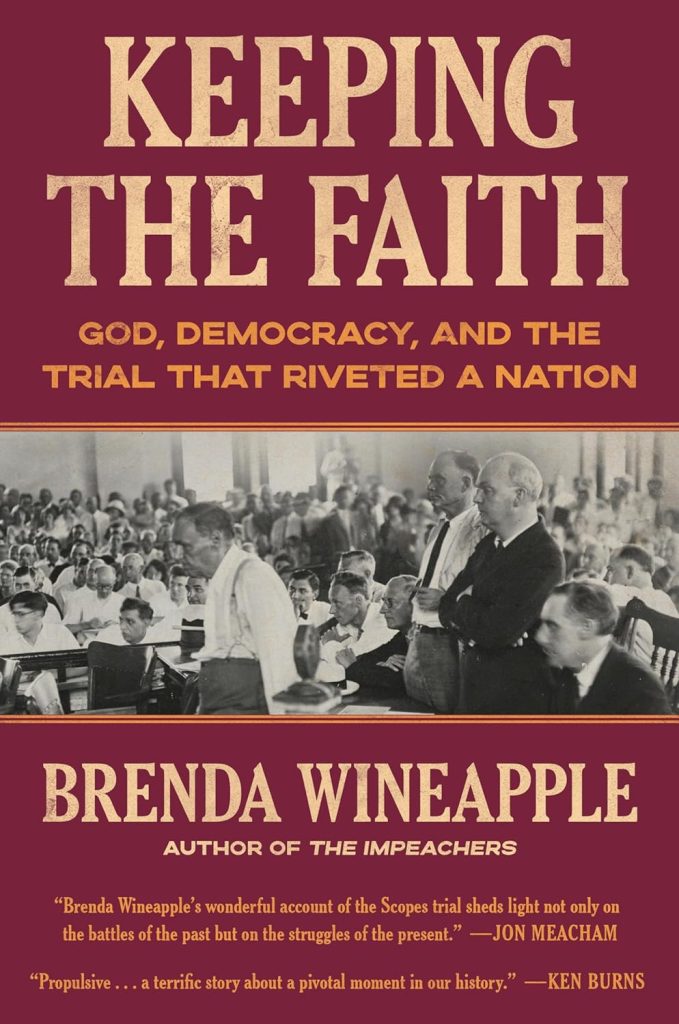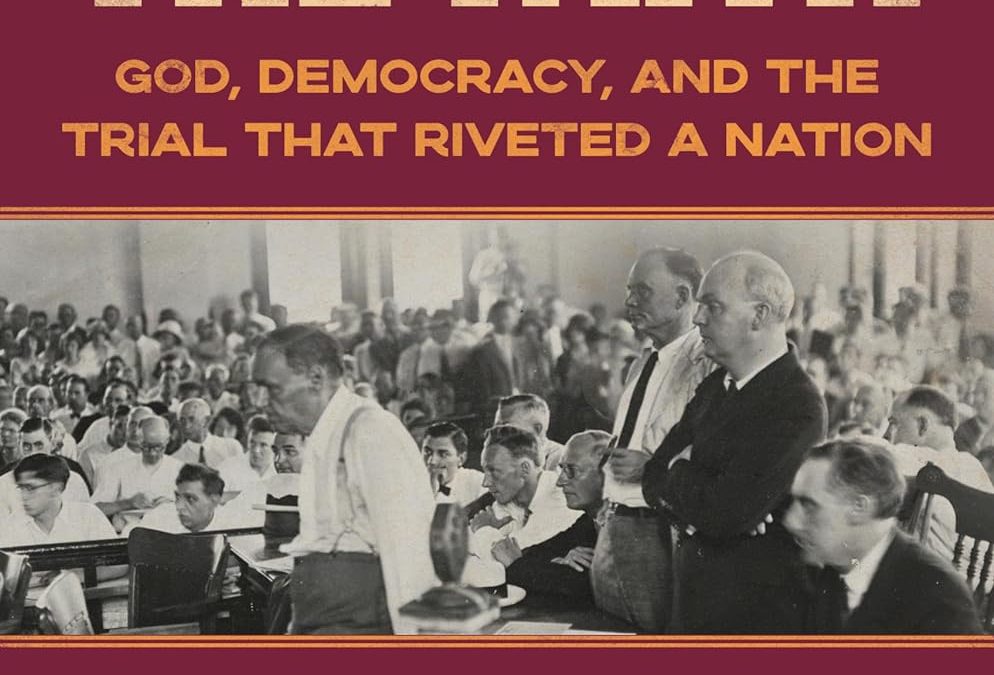
“Congress shall make no law respecting an establishment of religion, or prohibiting the free exercise thereof…”
These are the very first words of the US Constitution’s Bill of Rights. Despite this, there have been those throughout our nation’s history—including within Donald Trump’s MAGA movement today—claiming that we are a Christian nation. We are not. We do live in a nation with a majority of citizens describing themselves as Christian. However, the founders of this country explained themselves clearly in opposition to the idea of a Christian nation.
Nearly a century ago, this church and state question was put to a dramatic test.
Keeping the Faith: God, Democracy, and the Trial That Riveted a Nation (2024) by Brenda Wineapple is a captivating examination of the Scopes Monkey Trial of 1925. In the small town of Dayton, Tennessee, high school biology teacher John Scopes was arrested for violating a recently passed state statute which made it “unlawful for any teacher [in a public school] to teach any theory that denies the story of Divine Creation of man as taught in the Bible, and to teach instead that man has descended from a lower order of animals.”
At issue was Charles Darwin’s On the Origin of Species published in 1859, which put forth the evidence that species evolve over time through a process of natural selection. I’ll take a moment to explain my understanding of this theory of evolution because there are those who have distorted Darwin’s work to serve their own interests.
Among any given population of living organisms, differences exist. Those with characteristics that increase chances of survival are more likely to reproduce and therefore more likely to pass on those characteristics to offspring. Over time, these characteristics become more common within succeeding generations.
Of course, survivability among any given population is influenced by the environment so, as the environment changes, so too the characteristics that may increase or decrease the chances for survival and subsequent reproduction. The classic example of this phenomenon—because it occurred relatively quickly—involves light and dark colored peppered moths of England during the Industrial Revolution. Light-colored moths of this species were better suited for survival because they were camouflaged on light-colored trees and the lichens that grew on them. The few dark moths among the population were easy prey for birds.
During industrialization, many of these trees were darkened with soot and other air pollutants. The extremely small percentage of dark moths were now more likely to survive. By the end of the nineteenth century, the peppered moth population evolved from overwhelmingly light to overwhelmingly dark.*
Applying this principle of evolution to human beings flew directly in the face of human origins as described in the Bible. Christian Fundamentalists seethed at the idea that man evolved from lower forms of life, such as apes and monkeys. When John Scopes was arrested and put on trial in 1925, it was clear to all that he had broken the law. The larger question was whether the law itself was in violation of the Constitution’s protections of religious liberty and a separation of church and state. While questions such as this are typically handled within a more dignified federal court system including the US Supreme Court, this battle of science and religion played out in the most public of ways.
This is a really great story. Most fascinating is that the trial itself is not explored in Keeping the Faith with any detail until page 227. To understand the significance of the trial, it is necessary to understand the origins of the social and cultural divisions within a United States thoroughly transformed by technology, industrialization, urbanization, and more.
The Great War (1914-1918) had rent the fabric of Western Civilization. The decade that followed brought dramatic changes in American society. The role of women was changing, especially following the 19th Amendment granting the right to vote. For young people, courtship rituals moved from the front parlor to the back seat of widely popular and affordable Ford Model Ts. Hollywood movies were shown in theaters across the country. Many Americans purchased their first radio, bringing news, sporting events, and music directly into people’s homes. The 1920s is known as the Jazz Age because many Americans became enthralled with spiritually liberating music that got people out of their seats and onto the dance floor.
Millions of African Americans flocked to the cities of the North and Midwest, transforming these urban areas, especially the Harlem neighborhood of New York where a new wave of African American culture flourished.
It was during these tumultuous times that Christian Fundamentalists, especially in the South and Midwest, began to see an America drifting away from Christianity and the teachings of the Bible. Others saw a world being transformed by scientific discovery and invention. The Scopes trial became a battle between these two world views.
During a sweltering summer in Dayton, Tennessee, the players in this drama came straight from central casting. Heading up the prosecution was William Jennings Bryan, whom Wineapple describes as “the de facto voice of religious Fundamentalism and a leader of the Democratic Party for almost three decades… He believed in salvation by faith… through legislation that would thwart the temptations of drink and war and godless science.”
Bryan believed that, as Wineapple notes, many Americans—modernists—were behaving immorally and “opted for the consolation of a theocracy…a nation of Christians that legally enforced moral behavior and could thereby revive the values that he associated with a white, rural, decent and upstanding America. This would in turn restore, within the context of a centralized government, the pastoral life he imagined had once existed.” (I can’t help myself here: William Jennings Bryan wanted to make America great again.)
As has been hinted at in our own day, Bryan believed in the supremacy of the white race at a time when the Ku Klux Klan had re-emerged as a national power with an estimated six million members. As a rather profound example, thirty thousand robed klansmen marched down Pennsylvania Avenue in Washington DC during the same summer as the Scopes trial.
Ironically, many of these white supremacists distorted Darwin’s idea of “survival of the fittest” to suit their racism. In their view, the “fittest” was the white race, which was superior to other races. Of course, what Darwin actually meant was that certain characteristics of living organisms were more “fit” within their environment and thus conducive for survival and reproduction. This distortion is referred to as Social Darwinism and has been used to justify slavery, Nazism, massive wealth inequality, and more.
If any of this sounds familiar, remember that white supremacy and harsh restrictions on immigration, especially from non-white areas of the world, have been an enduring part of our nation’s history.
Scopes’ defense was funded by the newly formed American Civil Liberties Union (ACLU) and the lead attorney was Clarence Darrow. An avowed agnostic, Darrow argued that prohibiting teaching evolution in favor of the Bible would make it impossible to teach biology, geology and other science. For example, defenders of the Bible offered that the earth was only 6000 years old when science has demonstrated that the earth is over 4 billion years old.
Even so, this was going to be a tough sell for jurors who were, for the most part, religiously minded Christians whose lives were built upon their faith. And, the judge was a Christian Fundamentalist who deeply admired William Jennings Bryan. But Clarence Darrow, the city lawyer from Chicago, knew his audience. While he was certainly trying to convince these people from Dayton, Tennessee that the law prohibiting the teaching of evolution was a danger to free thinking, he understood that his approach was not to pit evolution against the Bible but to demonstrate that one’s faith need not be challenged by studying Darwin’s theory.
Darrow also saw the opportunity of the trial to educate the entire country because during this very public clash of ideas, over 100 journalists from across the country looked on. And, perhaps most crucially, the entire nation was transfixed as the Scopes trial was the first to be broadcast on radio.
“To Darrow,” as Wineapple writes, “there could be no democracy without reason, which is to say, without education and an educated people.” As a champion of the underdog, he believed in the Constitution and the enlightened ideas it was founded upon. “In my opinion,” an associate once said, [Darrow] was another Socrates… a sort of gadfly who bothered people and set their minds to working.”
There is evidence that at least a few folks were willing to entertain Clarence Darrow’s argument. “A group of university students in Tennessee,” Wineapple tells us, “petitioned the Tennessee legislature to consider a few more bills to promote the welfare of Tennessee’s children: amend the law of gravity, for instance, and do something about the excessive speed of light.”
The most fascinating and enlightening part of this story occurs when Darrow calls William Jennings Bryan to testify as an expert on the Bible. Adding to the drama is that the court house was crowded to overflowing for days and the building began to show signs of instability. The trial was moved to the courthouse lawn where spectators and journalists watched Darrow question Bryan as much of the country tuned in to hear.
In addition to questioning the age of the earth, Darrow asked whether Bryan really believed that God made Eve from Adam’s rib. He asked about the challenges faced by Noah as he gathered the animals in his Ark. He pointed out that the books of the Bible had been written by different men over long stretches of time. He also noted that religious scholars disagree as to the accuracy of varying translations of the Bible. He added that there are over 500 different versions of the Bible and then asked which of these is the literal word of God.
There is no doubt that Clarence Darrow won this particular battle of ideas but, as expected, John Scopes was found guilty—because he clearly was—and fined $100. On appeal to the Tennessee Supreme Court, the conviction was overturned in a manner that precluded an appeal to the US Supreme Court.
The Court has since weighed in on the matter. Today, the teaching of evolution is part of the science standards of all 50 states and the District of Columbia. Of course, the Court has taken on a rather new look in recent years and, considering their track record, this seems just the type of thing the majority of this group might like to revisit.
The story of the Scopes trial—dubbed the Monkey Trial by the acerbic cultural critic HL Mencken—is told in the 1960 star-studded film Inherit the Wind.** Spencer Tracy and Frederic March play the two lawyers.**
*https://en.wikipedia.org/wiki/Peppered_moth_evolution
**Movie Trailer for Inherit the Wind





